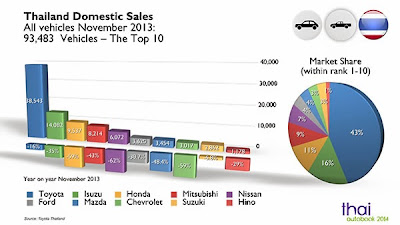HONDA IS POISED to win the Thai passenger-car crown for the first time in history after leading arch-rival Toyota in sales during the first 11 months of this year.
But there are complications that could affect Honda's outstanding performance with just a few days left in 2013, and it is about the way various car models are classified.
According to figures from Toyota Motor Thailand Co, which is normally quoted by the media as the designated auto-sales compiler, passenger-car sales figures do not include models such as the Honda CR-V or Mazda CX-5, which TMT classifies as commercial vehicles. However, both the CR-V and CX-5, although seen as sport-utility vehicles, are taxed as passenger cars.
The passenger-car tally from Toyota states that Honda was the leader in the segment during the first 11 months with sales of 178,973 units, while Toyota was second with 172,916 units.
Via THE NATION
But there are complications that could affect Honda's outstanding performance with just a few days left in 2013, and it is about the way various car models are classified.
According to figures from Toyota Motor Thailand Co, which is normally quoted by the media as the designated auto-sales compiler, passenger-car sales figures do not include models such as the Honda CR-V or Mazda CX-5, which TMT classifies as commercial vehicles. However, both the CR-V and CX-5, although seen as sport-utility vehicles, are taxed as passenger cars.
The passenger-car tally from Toyota states that Honda was the leader in the segment during the first 11 months with sales of 178,973 units, while Toyota was second with 172,916 units.
Via THE NATION














